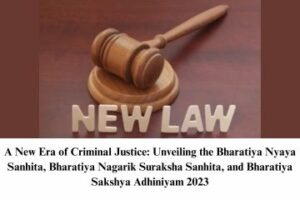Remedies Against a False Criminal Case
Written By: Mr Pulkit Taneja
Introduction
The Blackstone’s ratio is known to be one of the most debated and controversial principles of justice, ‘It is better that ten guilty persons escape than that one innocent suffer. With the growing crimes in society, an active and effective deterrence arrangement is perhaps very needful. It has become essential for the justice system to impose laws with strictness to punish those who are guilty of committing crimes. It is also critical to ensure that no innocent man, under false criminal charge, be punished like a criminal.
In the case of Subhash Kashinath Mahajan v State of Maharashtra, the Supreme Court, citing the report of the National Crime Records Bureau, stated, “As per data (Crime in India 2016 – Statistics) compiled by the National Crime Records Bureau stated “it is mentioned that in the year 2016,5347 cases were found to be false cases out of the investigated out of SC cases and 912 were found to be false cases out of ST cases.
It was pointed out that in the year 2015, out of 15638 cases decided by the courts, 11024 cases resulted in acquittal or discharge, 495 cases were withdrawn, and 4119 cases resulted in a conviction.”[1] With the growing rates of false criminal cases in India, one must know all the remedies they have if they are being implicated. There have been many instances where people in power have their political opponents arrested before elections.
This article will focus upon the remedies one has under various provisions, especially in the criminal procedure code, if implicated in a false criminal case.
First Information Report
A first Information Report (FIR) is the primary step of a criminal proceeding. Section 154 of the CrPC deals with the provisions of an FIR. There are many instances where false FIRs have been reported because of hostility, as mentioned above; there also are several remedies.
- Anticipatory Bail
Anticipatory bail application came into existence with the 41st law commission report. This provision enables an alleged accused person to apply for a pre-arrest bail application with the session court or the high court under section 438 of the CrPC. It is essential to note that one must be booked under a non-bailable offense to apply for anticipatory bail. It is also required that there must be an apprehension of the arrest. In Sushila Agarwal v. The State of Delhi,[2] the court discussed the period until an anticipatory bail lasted. The court unanimously held that there is no fixed period to limit the anticipatory bail. Moreover, an anticipatory bail does not end with the criminal trial’s start but can continue till the end of the trial. The apex court also reserved its right to determine the limit of anticipatory bail in some exceptional cases.
- Quashing of FIR
Section 482 of the CrPC enshrines the power of the High Courts to quash the FIR. This high court’s power is relevant when the courts believe that a particular criminal case that is being tried before them has no merits and is only used as a tool to harras or persecute. In-State of Haryana v. Bhajan Lal,[3] the Supreme Court laid down some guidelines that are to be followed before exercising power under 482 CrPC.
“No Prima Facie Case: Where the allegations made in the first information report or the complaint, even if they are taken at their face value and accepted in their entirety do not prima facie constitute any offence or make out a case against the accused.
Absence of Cognizable Offence: Where the allegations in the first information report and other materials, if any, accompanying the FIR do not disclose a cognizable offense, justifying an investigation by police officers Under Section 156(1) of the Code except under an order of a Magistrate within the purview of Section 155(2) of the Code.
Commission of Crime not disclosed: Where the uncontroverted allegations made in the FIR or complaint and the evidence collected in support of the same do not disclose the commission of any offence and make out a case against the accused.
The investigation began without the order of Magistrate in Non-cognizable offense: Where the allegations in the FIR do not constitute a cognizable offense but constitute only a non-cognizable offense, no investigation is permitted by a police officer without an order of a Magistrate as contemplated Under Section 155(2) of the Code.
Lack of Evidence: Where the allegations made in the FIR or complaint are so absurd and inherently improbable on the basis of which no prudent person can ever reach a just conclusion that there is sufficient ground for proceeding against the accused.
Legally Barred: Where there is an express legal bar engrafted in any of the provisions of the Code or the concerned Act (under which a criminal proceeding is instituted) to the institution and continuance of the proceedings and/or where there is a specific provision in the Code or the concerned Act, providing efficacious redress for the grievance of the aggrieved party.
Vexatious Proceeding: Where a criminal proceeding is manifestly attended with mala fide and/or where the proceeding is maliciously instituted with an ulterior motive for wreaking vengeance on the accused and with a view to spite him due to private and personal grudge.”[4]
- Penal Provisions for filling in false FIR
Section 182 and 211 of the Indian Penal Code clearly state the punishment for a person who knowingly provides wrong information to a public servant or a police officer to harass someone. The IPC also considers the possibility of a public servant being involved with falsely accusing someone of a criminal offense. Section 167 of the IPC states and penalizes any public servant who initiates a false FIR knowingly.
- Defamation and Compensation
After the trial and possible acquittal, the alleged accused person can file a suit of criminal defamation under section 499 of the Indian Penal Code against the person who has falsely accused a person of a criminal charge. Any person who is charged with a criminal charge is faced with a lot of speculations, and bad press. Section 250(1) of the CrPC allows the falsely accused person to demand compensation for a charge which had no merits.
Conclusion
The number of false cases has increased exponentially in the past decade. Although there are some remedies available for the falsely accused person, however, they do not circumscribe the harassment that is faced. India needs to come up with specialized effective legislation to provide deterrence against those who institute false criminal cases.
[1] Subhash Kashinath Mahajan v State of Maharashtra, AIR 2018 SC 1498.
[2] Sushila Agarwal v. The State of Delhi, SCC OnLine 2020 SC 98.
[3] State of Haryana v. Bhajan Lal, MANU/SC/0115/1992.
[4] Id.
Keywords: Remedies Against a False Criminal Case, Remedies Against a False Criminal case in India
Previous Posts
Delhi’s Air Pollution Governance
Laws For Prevention Of Animal Cruelty
Constitutional Amendments in India
The Crypto Currency and Regulation of Official Digital Currency Bill, 2021




